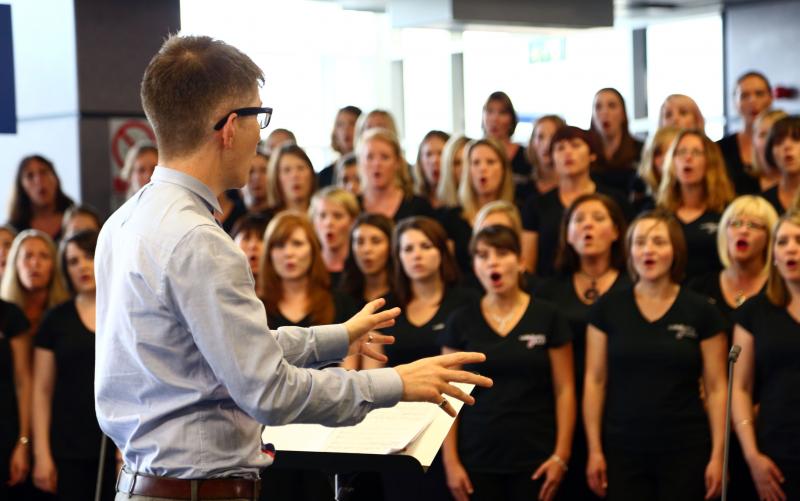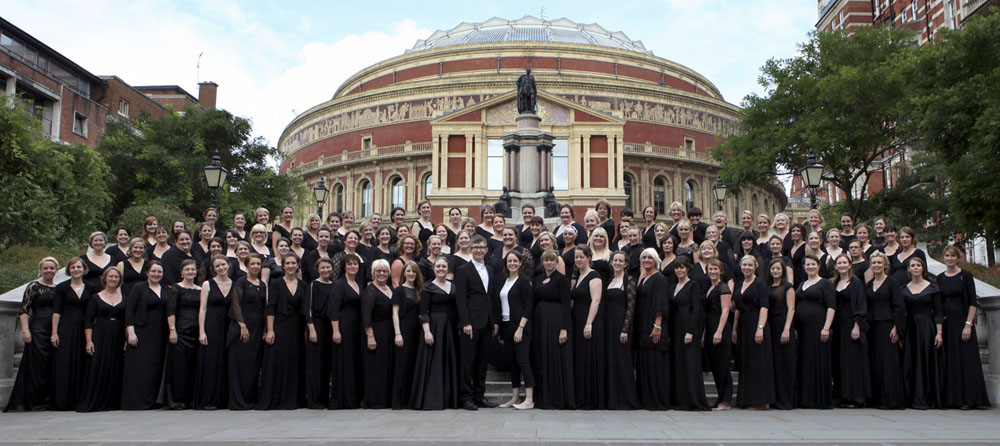The Choir: New Military Wives, BBC Two | reviews, news & interviews
The Choir: New Military Wives, BBC Two
The Choir: New Military Wives, BBC Two
How Gareth Malone took his new choir to the First World War centenary Prom

This feelgood programme hit all the buttons with almost unerring precision, as we followed Gareth Malone's project to prepare a military wives choir for a special prom, commemorating the World War One centenary on 3 August 2014. On the way we witnessed the joys of singing, the therapeutic value of music, and the virtues of hard work, mutual support and bonding.
However, most of us might harbour a natural suspicion and even an uneasy cynicism about everybody’s wonderful niceness, generosity, kindness and supportiveness. Not a meow was to be heard from any of the women, and conductor Gareth of course is universally adored, greeted by his choirs as a conquering hero. We badly needed some spice among the sugar, the only shadows being supplied by the inevitable separations of partners and families with soldiers on tours of duty abroad. (Below, the choir outside the Albert Hall, August 2014).
 The back story is familiar. In 2010 some army wives at Catterick, perhaps inspired by Malone’s programmes about starting community choirs, started a choir of their own, and drafted Malone to the cause. At Christmas 2011 the wives' original single "Wherever You Are" topped the charts by a huge margin, and also made a hefty financial contribution to military charities. The Military Wives Choir Foundation itself was founded in 2012.
The back story is familiar. In 2010 some army wives at Catterick, perhaps inspired by Malone’s programmes about starting community choirs, started a choir of their own, and drafted Malone to the cause. At Christmas 2011 the wives' original single "Wherever You Are" topped the charts by a huge margin, and also made a hefty financial contribution to military charities. The Military Wives Choir Foundation itself was founded in 2012.
For the World War One Prom, what should the Military Wives Choir sing, and who should sing it? Via email auditions, Malone finally selected 100 singers out of 400 applications from 42 different choirs. He also visited the charming and scholarly archivist of the Royal Academy of Music to find appropriate music from the period. An unexpected fact emerged: because the men were away at war, more choral material was written for women’s voices during the war.
There was one unusual technical problem which provided the musical tension of the real-life story. Holst’s sumptuous Ave Maria is a choral setting for eight parts, and the Military Wives had hitherto only sung three-part pieces. Their conductor was understandably worried about whether his amateurs, devoted as they are, were up to it. The logistics of getting 100 singers together from various locations were partly solved for most of the rehearsal period by separating the singers into three separate choirs, bringing them all together just for the final rehearsals.
 Cue much driving about Britain, and one very affecting event: the choir visited the vast empty building in Nottingham which in 1914-1918 housed the largest munitions factory in Britain, supplying half the ammunition for the entire war – and staffed by women. The choir sang in tribute to those workers, several hundred of whom had been killed or wounded by an unexplained explosion near the end of the war. The choir also went to Brize Norton air base to welcome returning soldiers with a performance of Elgar’s The Snow, which seemed perhaps a step too far for people just anxious to be united with their families.
Cue much driving about Britain, and one very affecting event: the choir visited the vast empty building in Nottingham which in 1914-1918 housed the largest munitions factory in Britain, supplying half the ammunition for the entire war – and staffed by women. The choir sang in tribute to those workers, several hundred of whom had been killed or wounded by an unexplained explosion near the end of the war. The choir also went to Brize Norton air base to welcome returning soldiers with a performance of Elgar’s The Snow, which seemed perhaps a step too far for people just anxious to be united with their families.
The grit in the pearl is Malone’s ambition, not only for the choir’s achievements but also, and oddly attractive because so honest, for his own. “I’ve just got to do it,” he declared – that is, conduct at the Proms – “and I’ve just got to pray.” It was also perhaps curious that in spite of the broad spectrum of class on view in the choirs, not a single black face was to be seen singing.
The second part, climaxing with views backstage and at the Prom, will be broadcast on Christmas Eve, and the whole Prom itself on Boxing Day.
rating
Explore topics
Share this article
Add comment
The future of Arts Journalism
You can stop theartsdesk.com closing!
We urgently need financing to survive. Our fundraising drive has thus far raised £49,000 but we need to reach £100,000 or we will be forced to close. Please contribute here: https://gofund.me/c3f6033d
And if you can forward this information to anyone who might assist, we’d be grateful.

Subscribe to theartsdesk.com
Thank you for continuing to read our work on theartsdesk.com. For unlimited access to every article in its entirety, including our archive of more than 15,000 pieces, we're asking for £5 per month or £40 per year. We feel it's a very good deal, and hope you do too.
To take a subscription now simply click here.
And if you're looking for that extra gift for a friend or family member, why not treat them to a theartsdesk.com gift subscription?
more TV
 The Narrow Road to the Deep North, BBC One review - love, death and hell on the Burma railway
Richard Flanagan's prize-winning novel becomes a gruelling TV series
The Narrow Road to the Deep North, BBC One review - love, death and hell on the Burma railway
Richard Flanagan's prize-winning novel becomes a gruelling TV series
 The Waterfront, Netflix review - fish, drugs and rock'n'roll
Kevin Williamson's Carolinas crime saga makes addictive viewing
The Waterfront, Netflix review - fish, drugs and rock'n'roll
Kevin Williamson's Carolinas crime saga makes addictive viewing
 theartsdesk Q&A: writer and actor Mark Gatiss on 'Bookish'
The multi-talented performer ponders storytelling, crime and retiring to run a bookshop
theartsdesk Q&A: writer and actor Mark Gatiss on 'Bookish'
The multi-talented performer ponders storytelling, crime and retiring to run a bookshop
 Ballard, Prime Video review - there's something rotten in the LAPD
Persuasive dramatisation of Michael Connelly's female detective
Ballard, Prime Video review - there's something rotten in the LAPD
Persuasive dramatisation of Michael Connelly's female detective
 Bookish, U&Alibi review - sleuthing and skulduggery in a bomb-battered London
Mark Gatiss's crime drama mixes period atmosphere with crafty clues
Bookish, U&Alibi review - sleuthing and skulduggery in a bomb-battered London
Mark Gatiss's crime drama mixes period atmosphere with crafty clues
 Too Much, Netflix - a romcom that's oversexed, and over here
Lena Dunham's new series presents an England it's often hard to recognise
Too Much, Netflix - a romcom that's oversexed, and over here
Lena Dunham's new series presents an England it's often hard to recognise
 Insomnia, Channel 5 review - a chronicle of deaths foretold
Sarah Pinborough's psychological thriller is cluttered but compelling
Insomnia, Channel 5 review - a chronicle of deaths foretold
Sarah Pinborough's psychological thriller is cluttered but compelling
 Live Aid at 40: When Rock'n'Roll Took on the World, BBC Two review - how Bob Geldof led pop's battle against Ethiopian famine
When wackily-dressed pop stars banded together to give a little help to the helpless
Live Aid at 40: When Rock'n'Roll Took on the World, BBC Two review - how Bob Geldof led pop's battle against Ethiopian famine
When wackily-dressed pop stars banded together to give a little help to the helpless
 Hill, Sky Documentaries review - how Damon Hill battled his demons
Alex Holmes's film is both documentary and psychological portrait
Hill, Sky Documentaries review - how Damon Hill battled his demons
Alex Holmes's film is both documentary and psychological portrait
 Outrageous, U&Drama review - skilfully-executed depiction of the notorious Mitford sisters
A crack cast, clever script and smart direction serve this story well
Outrageous, U&Drama review - skilfully-executed depiction of the notorious Mitford sisters
A crack cast, clever script and smart direction serve this story well
 Prost, BBC 4 review - life and times of the driver they called 'The Professor'
Alain Prost liked being world champion so much he did it four times
Prost, BBC 4 review - life and times of the driver they called 'The Professor'
Alain Prost liked being world champion so much he did it four times
 The Buccaneers, Apple TV+, Season 2 review - American adventuresses run riot in Cornwall
Second helping of frothy Edith Wharton adaptation
The Buccaneers, Apple TV+, Season 2 review - American adventuresses run riot in Cornwall
Second helping of frothy Edith Wharton adaptation

Comments
At no point does this review
Am I alone in finding the
You seem to me to be one of
I sang 'The Snow' at school
Gareth wants the whole world